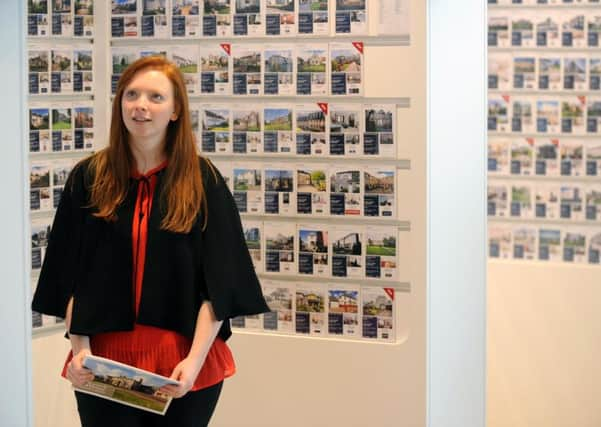Lack of homes '˜crippling' the Capital as property prices surge


New research into the state of Edinburgh’s housing market found increased competition for property and sky-high premiums was “pricing out” first-time buyers in the city.
Figures released by a leading estate agents found just over 1,000 homes are currently listed as on the market in the city – down by more than half on last year’s figures.
Advertisement
Hide AdAdvertisement
Hide AdThe Warners report also uncovered prospective homeowners were paying enormous premiums on properties, with more than 84 per cent of those sold achieving a price in excess of their valuation during 2017, a 55 per cent rise on the previous 12 months.
It comes after think-tank The Resolution Foundation predicted up to a third of UK millennials face living in private rented accommodation all their lives due to rocketing costs.
David Marshall, operations director at Warners, said the short supply was “characteristic” of the current market.
Around 2,500 homes were up for sale in April 2017, 1,500 more than the current listing.
Advertisement
Hide AdAdvertisement
Hide AdHowever, Mr Marshall warned the market would continue to be stacked against buyers over the next 12 months.
He said: “The main driver for the strong seller’s market is simply a lack of properties available for sale.
“This supply shortage has been typical of the market for a number of years now, with fewer homes listed for sale encouraging fewer potential movers to act.
“This is compounded as Edinburgh’s population increases and older buyers increasingly look to downsize.”
Advertisement
Hide AdAdvertisement
Hide AdHe continued: “In many areas of the UK, and in particular further south, the market has already begun to cool, so it is reasonable to think that this will have a knock-on effect for the rest of the country in due course.
“This is unlikely to be sufficient to fully redress the current imbalance between supply and demand however and overall the market is likely to remain challenging for buyers throughout 2018.”
The figures come just four months after an ESPC report predicted first-time buyers in Edinburgh and Glasgow would need to save up to £58,000 to afford the deposit on a home by 2028.
In January, ESPC figures revealed the average selling price for a two-bedroom home in the city between October and December 2017 rose by more than nine per cent to around £253,000.
Advertisement
Hide AdAdvertisement
Hide AdAndrew Meehan, associate director of Rettie & Co described the trend as “ominous” for buyers, adding it affected those at both ends of the housing market.
He said: “This trend of low supply is more acute in certain neighbourhoods causing issues for buyers in different price brackets. At the upper end of the market, low supply is manifesting itself in highly competitive closing dates in areas such as the New Town, Stockbridge and Morningside.
“This is driving up prices, and percentages over home report values, as substantial buying power is going unsated.”
Mr Meehan continued: “At the other end, first-time buyers are seeing fewer options available in areas that have traditionally offered value for money. Areas such as Leith, Dalry and Gorgie have seen first-time buyers face stiff competition from investors often resulting in dozens of notes of interest and competitive closing dates in these vibrant, but usually affordable neighbourhoods.”
Advertisement
Hide AdAdvertisement
Hide AdGreen councillor Claire Miller, who sits on the council’s housing and economy committee, blamed the shortfall on the number of homes being reappropriated for use as holiday lets, as property owners look to cash in on the Capital’s booming tourist industry.
Cllr Miller added: “Edinburgh urgently needs more homes within reach of younger people and people on the kinds of incomes that make the city tick: carers, health professionals, teachers and so on.
“As a city centre councillor I am worried that far too many homes are being taken out of residential use and into the holiday market. If that is one of the factors that lies behind a possible drop in supply then it is all the more reason to take radical action to prevent homes being lost in this way.”
Graeme Brown, director of Shelter Scotland, added: “Soaring house prices is not good news for everyone. It is a product of a broken housing system and a part of the answer to this is to build affordable housing in places where people want to live.”